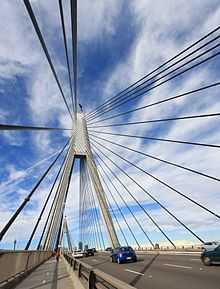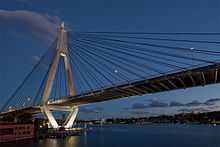ANZAC Bridge
| ANZAC Bridge | |
|---|---|
 | |
| Carries | 8 road lanes, pedestrians and bicycles |
| Crosses | Johnstons Bay |
| Locale | Sydney, New South Wales, Australia |
| Official name | ANZAC Bridge |
| Maintained by | Roads and Traffic Authority |
| Characteristics | |
| Design | Cable Stayed |
| Total length | 805m[1] |
| Width | 32.2m |
| Longest span | 345m[1] |
| History | |
| Construction cost | $170 million AUD[2] |
| Opened | 1995 |
The ANZAC Bridge or Anzac Bridge (both forms are used by the Roads and Maritime Services), replacing the earlier Glebe Island Bridge, is an 8-lane cable-stayed bridge spanning Johnstons Bay between Pyrmont and Glebe Island (part of the suburb of Rozelle), close to the central business district of Sydney, Australia. The bridge forms part of the Western Distributor leading from the Sydney CBD and Cross City Tunnel to the suburbs of the Inner West and Northern Sydney.
History
Glebe Island Bridge
There were two bridges over Johnstons Bay before the construction of the ANZAC Bridge.
The first bridge was constructed as part of a project to move the abattoirs out of central Sydney, and to construct public abattoirs at Glebe Island.[3] The first pile of the original bridge was driven in October 1860.[4] The bridge was opened in 1862 and was a timber beam bridge 1,045 ft 5 in. (318.6 m) long and 28 feet (8.5 m) wide with a 40-foot (12 m) swing section on the eastern side. It replaced a double steam punt crossing.[4]
The second Glebe Island Bridge was an electrically operated swing bridge opened in 1903, the year after the opening of the new Pyrmont Bridge over Sydney's Darling Harbour, which has a similar design. The bridge was designed by Percy Allan of the New South Wales Public Works Department who also designed the Pyrmont Bridge. Delays due to increasing traffic, which were exacerbated by having to close a major arterial road to allow the movement of shipping into Blackwattle Bay, led to the construction of the present-day ANZAC Bridge. The 1903 bridge is still standing (2011), but there is no access to pedestrians or vehicular traffic.
ANZAC Bridge

The Stay Cable design concept development and final design for the new bridge were carried out by the Roads & Traffic Authority of NSW and the construction by Baulderstone Pty. Ltd.[5] The bridge was opened to traffic on 3 December 1995.[6]
The bridge was given its current name on Remembrance Day in 1998 to honour the memory of the soldiers of the Australian and New Zealand Army Corps (ANZAC) who served in World War I. An Australian Flag flies atop the eastern pylon and a New Zealand Flag flies atop the western pylon. A bronze memorial statue of an Australian ANZAC soldier ("digger") holding a Lee Enfield rifle in the "rest on arms reverse" drill position was placed on the western end of the bridge on ANZAC Day in 2000. A statue of a New Zealand soldier was added to a plinth across the road from the Australian Digger, facing towards the east, and was unveiled by Prime Minister of New Zealand Helen Clark in the presence of Premier of New South Wales Morris Iemma on Sunday 27 April 2008.[7]
Description
it is 32.2m wide and the main span is 345 metres (1,132 ft) long. The reinforced concrete pylons are 120 metres (390 ft) high and support the deck by two planes of stay cables. Initially the stay cables were plagued by vibrations which have since been resolved by the addition of thin stabilising cables between the stay cables.
There is a pedestrian path / bikeway that runs along the northern side of the bridge, making possible a leisurely 30-40 minute walk from Glebe Point Road, down Bridge Road, over the Bridge and round Blackwattle Bay back to Glebe Point Road.
The bridge can carry a maximum of 180,000 cars per day. It reached its maximum capacity in 2002, only seven years after it was finished. Despite this, the proposed WestConnex motorway is expected to funnel tens of thousands more cars from the M4 Western Motorway onto the ANZAC Bridge.[8]
The bridge was criticised by some as over-engineered because its size and cost were justified in order to permit shipping into Johnstons Bay. However, this bay ceased to have substantial use for shipping soon after construction was completed.[9]
The bridge is now regularly patrolled by security guards as a counter-terrorism measure. Security cameras also monitor the walkway.
Popular culture
The first line of the 1995 You Am I song "Purple Sneakers" is "Had a scratch only you could itch / underneath the Glebe Point bridge". The Tim Rogers lyric likely refers to the 1903 Glebe Island Bridge.
Parts of the film clip for Deni Hines' song 'It's Alright' appear to have been recorded on the bridge prior to its opening.
Gallery
-

ANZAC Bridge at dusk
-
Aerial view of Sydney Harbour from the west in 2008. ANZAC Bridge is visible at lower centre right, while the second Glebe Island Bridge is visible to the left of ANZAC Bridge
-
The Bridges stay cables were plagued by vibrations which have since been resolved by the addition of thin stabilizing cables (pictured) between the stay cables.
-
ANZAC Australian soldier statue on the north-western side of the bridge
-
The point where the stay cables meet the top of the pylon
-
The second Glebe Island Bridge viewed from water level, with the deck of the ANZAC Bridge visible above
See also
- List of bridges in Sydney
- List of longest cable stayed bridges
References
- ↑ 1.0 1.1 "ANZAC Bridge". Structurae. Retrieved 2010-02-03.
- ↑ http://www.groveoz.info
- ↑ "REMOVAL OF THE SLAUGHTER HOUSES FROM SYDNEY.". The Sydney Morning Herald. 22 October 1860. Retrieved 10 November 2010.
- ↑ 4.0 4.1 "COMMENCEMENT OF THE GLEBE ISLAND BRIDGE". The Sydney Morning Herald. 11 October 1860. Retrieved 10 November 2010.
- ↑ ANZAC Bridge at Structurae
- ↑ "ANZAC Bridge Sydney". member.rivernet.com.au. February 2010. Archived from the original on 5 April 2008. Retrieved 2008-04-03.
- ↑ Samandar, Lema (27 April 2008). "Kiwi joins his little mate on Anzac Bridge watch". Sydney Morning Herald. Retrieved 2010-02-03.
- ↑ Ranby, Lester (February 1, 2014). "WestConnex – destined to fail". The Stringer (Perth).
- ↑ "The Bridge Too High". "Inner Sydney Voice" (Inner City Regional Council for Social Development) (112): 17.
External links
- Description and history (with construction photos) of the Anzac Bridge, Sydney
- Road Traffic Authority Webcam
- ANZAC Bridge at Structurae
| Wikimedia Commons has media related to ANZAC Bridge. |
| Wikimedia Commons has media related to Glebe Island Bridge. |
Coordinates: 33°52′10″S 151°11′09″E / 33.869340°S 151.185780°E
| ||||||||||||||||||||||||||||||||||||||||||||||




